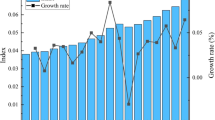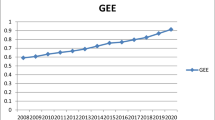Abstract
China’s high-level opening-up benefits its economic growth. The significance of supporting regional high-quality green development by enhancing foreign capital use and outbound foreign investment has grown in recent years. This paper develops a regional development assessment system and calculates the index of each region by using entropy method. Then, it introduces a capacity coupling system model to measure the two-way FDI synergy. Finally, it employs the spatial model that was developed to assess the synergy’s influence on regional green development under the environmental decentralization. According to the findings, the synergy can improve the local development. However, it inhibits the improvement of economic development quality in neighboring regions. In addition, environmental decentralization negatively moderates the synergy’s on the local development. Therefore, the central government needs to implement targeted economic policies to shorten the development gap between regions, fully use the positive role of environmental decentralization and improve the local development.

Similar content being viewed by others
Data availability
Data and materials are available from the authors upon request.
References
Abdo, A. B., Li, B., Qahtan, A. S. A., Abdulsalam, A., Aloqab, A., & Obadi, W. (2022). The influence of FDI on GHG emissions in BRI countries using spatial econometric analysis strategy: The significance of biomass energy consumption. Environmental Science and Pollution Research, 29(36), 54571–54595.
Ahmad, F., Draz, M. U., Chandio, A. A., Su, L., Ahmad, M., & Irfan, M. (2021). Investigating the myth of smokeless industry: environmental sustainability in the ASEAN countries and the role of service sector and renewable energy. Environmental Science and Pollution Research, 28(39), 55344–55361.
Ahmad, F., Draz, M. U., Chandio, A. A., Ahmad, M., Su, L., Shahzad, F., & Jia, M. (2022). Natural resources and environmental quality: Exploring the regional variations among Chinese provinces with a novel approach. Resources Policy, 77, 102745.
Ahmad, F., Draz, M. U., Chang, W. Y., Yang, S. C., & Su, L. (2021). More than the resource curse: Exploring the nexus of natural resource abundance and environmental quality in northwestern China. Resources Policy, 70, 101902.
Ahmad, F., Draz, M. U., Ozturk, I., Su, L., & Rauf, A. (2020). Looking for asymmetries and nonlinearities: the nexus between renewable energy and environmental degradation in the Northwestern provinces of China. Journal of Cleaner Production, 266, 121714.
Cai, L., & Guo, L. (2023). Environmental decentralization, environmental regulation and environmental pollution: Evidence from China. Polish Journal of Environmental Studies, 32(3), 2053–2068.
Chang, L., Saydaliev, H. B., Meo, M. S., & Mohsin, M. (2022). How renewable energy matter for environmental sustainability: Evidence from top-10 wind energy consumer countries of European Union. Sustainable Energy, Grids and Networks, 31, 100716.
Chang, L., Lu, Q., Ali, S., & Mohsin, M. (2022a). How does hydropower energy asymmetrically affect environmental quality? Evidence from quantile-based econometric estimation. Sustainable Energy Technologies and Assessments, 53, 102564.
Cheng, D., & Wang, M. (2021). Influence of financial agglomeration on regional high-quality development in the Yellow River Basin. China Population, Resources and Environment, 31(8), 137–147. Chinese.
Dong, W., Zhang, Z., & Liu, D. (2021). The effect of two-way FDI synergy and regional technology innovation on environmental pollution. China Population, Resources and Environment, 31(12), 71–82. Chinese.
Fang, Z., Razzaq, A., Mohsin, M., & Irfan, M. (2022). Spatial spillovers and threshold effects of internet development and entrepreneurship on green innovation efficiency in China. Technology in Society, 68, 101844.
Feng, S., Sui, B., Liu, H., & Li, G. (2020). Environmental decentralization and innovation in China. Economic Modelling, 93, 660–674.
Hao, Y., Gai, Z., Yan, G., Wu, H., & Muhammad, I. (2021). The spatial spillover effect and nonlinear relationship analysis between environmental decentralization, government corruption and air pollution: Evidence from China. Science of the Total Environment, 763, 144183.
Hottenrott, H., & Rexhäuser, S. (2015). Policy-induced environmental technology and inventive efforts: Is there a crowding out? Industry and Innovation, 22(5), 375–401.
Hou, Y. (2023). Research on the new kinetic energy and path of high-quality development of cities along the Yellow River from the perspective of scene theory. Journal of Xinyang Normal University (philosophy and Social Sciences Edition), 2, 58–61. Chinese.
Irfan, M., Elavarasan, R. M., Ahmad, M., Mohsin, M., Dagar, V., & Hao, Y. (2022). Prioritizing and overcoming biomass energy barriers: Application of AHP and G-TOPSIS approaches. Technological Forecasting and Social Change, 177, 121524.
Li, C., Wan, J., Xu, Z., & Lin, T. (2021a). Impacts of green innovation, institutional constraints and their Interactions on high-quality economic development across China. Sustainability, 13(9), 5277.
Li, D., & Hu, S. (2021). How does technological innovation mediate the relationship between environmental regulation and high-quality economic development? Empirical Evidence from China. Sustainability, 13(4), 2231.
Li, G., Guo, F., & Di, D. (2021b). Regional competition, environmental decentralization, and target selection of local governments. Science of the Total Environment, 755(Pt 1), 142536.
Lin, B., & Xu, C. (2022). Does environmental decentralization aggravate pollution emissions? Microscopic evidence from Chinese industrial enterprises. Science of the Total Environment, 829, 154640.
Liu, C., Zhang, X., & Tamamine, T. (2019). Causal relationship between FDI flow and technological innovation in China and Japan. Journal of Advanced Computational Intelligence and Intelligent Informatics, 23(3), 536–545.
Liu, L., Meng, S., & Yu, J. (2022a). Innovation from spatial spillovers of FDI and the threshold effect of urbanization: Evidence from Chinese cities. Sustainability, 14(10), 6266.
Liu, Y., Tian, L., Sun, H., Zhang, X., & Kong, C. (2022b). Option pricing of carbon asset and its application in digital decision-making of carbon asset. Applied Energy, 310, 118375.
Liu, Y., Xu, L., Sun, H., Chen, B., & Wang, L. (2023). Optimization of carbon performance evaluation and its application to strategy decision for investment of green technology innovation. Journal of Environmental Management, 325, 116593.
Luo, Y., Salman, M., & Lu, Z. (2021b). Heterogeneous impacts of environmental regulations and foreign direct investment on green innovation across different regions in China. Science of the Total Environment, 759, 143744.
Luo, S., Shi, Y., Sun, Y., Zhao, Z., & Zhou, G. (2021a). Can FDI and ODI two-way flows improve the quality of economic growth? Empirical evidence from China. Applied Economics, 53(44), 5028–5050.
Najabat, A., Khamphe, P., Kuaanan, T., Waheed, A., Shah, A., Dhanraj, J. A., & Khan, A. (2022). FDI, green Innovation and environmental quality nexus: New insights from BRICS economies. Sustainability, 14(4), 2181.
Pan, X., Guo, S., Han, C., Wang, M., Song, J., & Liao, X. (2020). Influence of FDI quality on energy efficiency in China based on seemingly unrelated regression method. Energy, 192, 116463.
Pei, T., Gao, L., Yang, C., Xu, C., Tian, Y., & Song, W. (2021). The impact of FDI on urban PM25 pollution in China: The mediating effect of industrial structure transformation. International Journal of Environmental Research and Public Health, 18(17), 9107.
Qu, X., & Liu, L. (2021). Impact of environmental decentralization on high-quality economic development. Statistical Research, 38(3), 16–29. Chinese.
Ran, Q., Zhang, J., & Hao, Y. (2020). Does environmental decentralization exacerbate China’s carbon emissions? Evidence based on dynamic threshold effect analysis. Science of the Total Environment, 721, 137656.
Ren, S., Hao, Y., & Wu, H. (2022). The role of outward foreign direct investment (OFDI) on green total factor energy efficiency: Does institutional quality matters? Evidence from China. Resources Policy, 76, 102587.
Rizwana, Y., Cui, Z., Wasi Ul, H. S., Muhammad Abdul, K., & Anwar, K. (2022). Exploring the role of biomass energy consumption, ecological footprint through FDI and technological innovation in B&R economies: A simultaneous equation approach. Energy, 244, 122703.
Tang, J., & Li, S. (2022). How do environmental regulation and environmental decentralization affect regional green innovation? Empirical research from China. International Journal of Environmental Research and Public Health, 19(12), 7074.
Wang, S., Chen, F., Liao, B., & Zhang, C. (2020). Foreign trade, FDI and the upgrading of regional industrial structure in China: Based on spatial econometric model. Sustainability, 12(3), 815.
Wang, Y., Liao, M., Wang, Y., Malik, A., & Xu, L. (2019). Carbon emission effects of the coordinated development of two-way foreign direct investment in China. Sustainability, 11(8), 2428.
Wei, X., Mohsin, M., & Zhang, Q. (2022). Role of foreign direct investment and economic growth in renewable energy development. Renewable Energy, 192, 828–837.
Wu, H., Li, Y., Hao, Y., Ren, S., & Zhang, P. (2020). Environmental decentralization, local government competition, and regional green development: Evidence from China. Science of the Total Environment, 708, 135085.
Xu, Y., & Wang, H. (2020). The construction and demonstration of regional high-quality development index system based on “five development ideas.” Statistics & Decision, 36(14), 98–102. Chinese.
Yang, K., Wang, C., & Wen, Y. (2018). The threshold effect of two-way FDI on environmental pollution under environmental regulation. Journal of Environmental Accounting and Management, 6(2), 115–124.
Zeng, M., Liu, L., Zhou, F., & Xiao, Y. (2021). How does environmental regulation affect the relationship between FDI and technological innovation: From the perspective of technology transactions. Processes, 9(8), 4641–4653.
Zhang, W., & Li, G. (2020). Environmental decentralization, environmental protection investment, and green technology innovation. Environmental Science and Pollution Research International, 29(9), 1–16.
Zhang, D., Mohsin, M., & Taghizadeh-Hesary, F. (2022). Does green finance counteract the climate change mitigation: Asymmetric effect of renewable energy investment and R&D. Energy Economics, 113, 106183.
Zhang, J., Zhang, K., & Zhao, F. (2020). Research on the regional spatial effects of green development and environmental governance in China based on a spatial autocorrelation model. Structural Change and Economic Dynamics, 55, 1–11.
Zhang, Y. M., Wang, X. Y., & Zhao, J. K. (2023). Study on the path of digital economy driving China’s high-quality development. Journal of Xinyang Normal University (philosophy and Social Sciences Edition), 2, 28–34. Chinese.
Zhao, L., Shao, K., & Ye, J. (2022). The impact of fiscal decentralization on environmental pollution and the transmission mechanism based on promotion incentive perspective. Environmental Science and Pollution Research, 29(57), 86634–86650.
Zhao, J., Patwary, A. K., Qayyum, A., Alharthi, M., Bashir, F., Mohsin, M., et al. (2022a). The determinants of renewable energy sources for the fueling of green and sustainable economy. Energy, 238, 122029.
Zheng, C., Zhuo, C., & Deng, F. (2022). Coordination of IFDI and OFDI, government innovation support, and China’s industrial green transformation. Environmental Science and Pollution Research International. https://doi.org/10.1007/S11356-022-21499-X
Zhu, Y., Gao, H., & Xu, Y. (2022). How does coordinated development of two-way FDI reduce regional CO2 mission Intensity? Based on the mediating effect of enterprise green technology innovation and the moderating effect of government quality. Soft Science, 36(2), 86–94. Chinese.
Zou, X., Lei, C., Gao, K., & Hu, C. (2019). Impact of environmental decentralization on regional green development. The Journal of Environment & Development, 28(4), 412–441.
Zou, Z., & Chen, X. (2022). The impact of FDI on China’s technology innovation and high-quality economic development with the constraints of environmental regulation: A mechanism test based on the mediation effect and the threshold effect. Science & Technology Progress and Policy, 39(13), 1–11. Chinese.
Funding
This research was funded by National Natural Science Foundation of China (72204099, 72004082), Humanities and Social Sciences Fund of Ministry of Education of China (21YJC790021), and the Philosophy and Social Sciences Excellent Innovation Team Construction Foundation of Jiangsu province (SJSZ2020-20).
Author information
Authors and Affiliations
Contributions
JZ was involved in methodology, writing original draft, and funding acquisition. GY contributed to conceptualization, validation, writing—review and editing, and funding acquisition. XD was involved in data collection, data curation, and funding acquisition. LY contributed to data collection and data curation.
Corresponding authors
Ethics declarations
Conflict of interest
The authors declare no competing interest.
Additional information
Publisher's Note
Springer Nature remains neutral with regard to jurisdictional claims in published maps and institutional affiliations.
Rights and permissions
Springer Nature or its licensor (e.g. a society or other partner) holds exclusive rights to this article under a publishing agreement with the author(s) or other rightsholder(s); author self-archiving of the accepted manuscript version of this article is solely governed by the terms of such publishing agreement and applicable law.
About this article
Cite this article
Zhang, J., Yang, G., Ding, X. et al. Can two-way FDI synergy promote regional high-quality green development under environmental decentralization?. Environ Dev Sustain (2023). https://doi.org/10.1007/s10668-023-04120-0
Received:
Accepted:
Published:
DOI: https://doi.org/10.1007/s10668-023-04120-0




